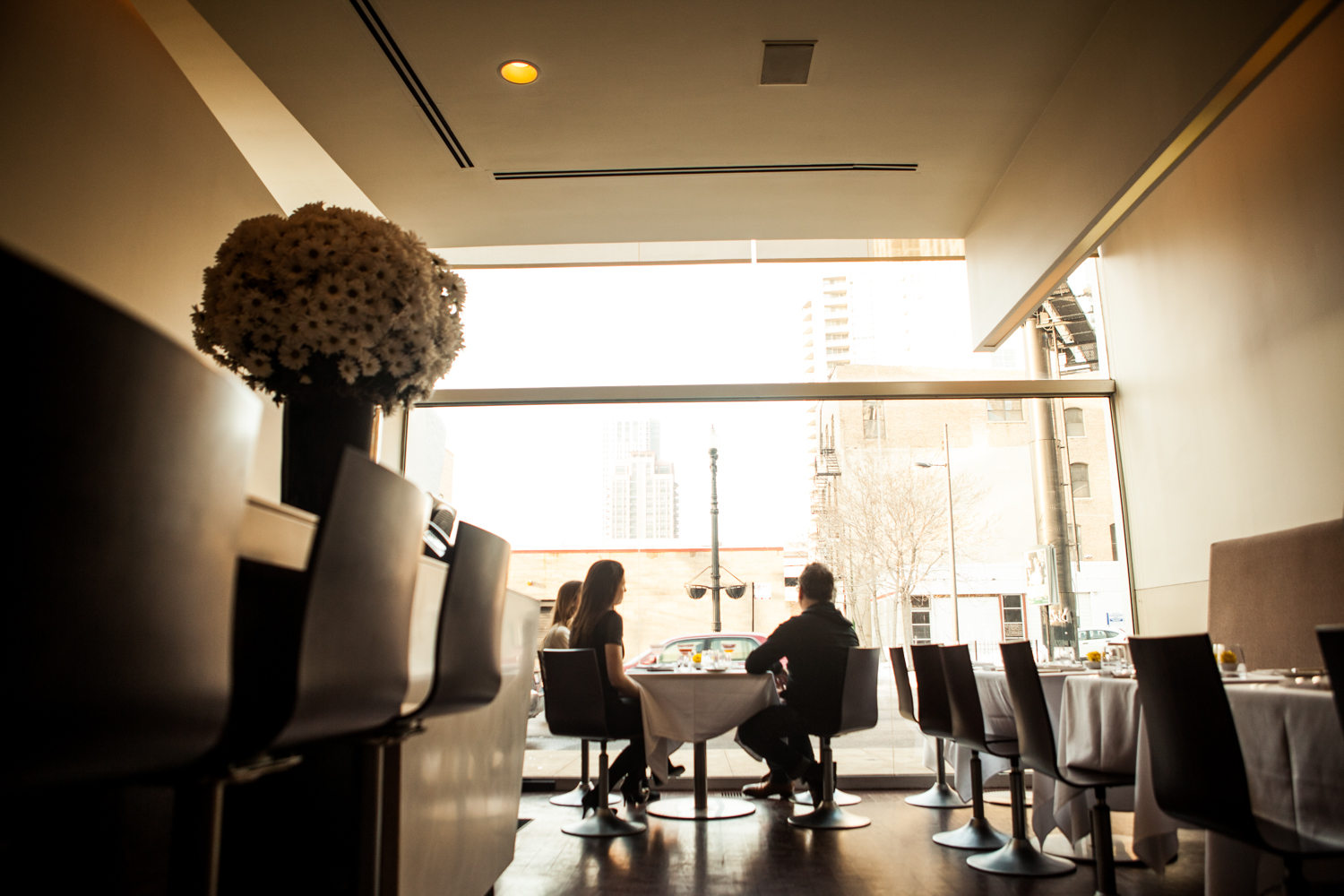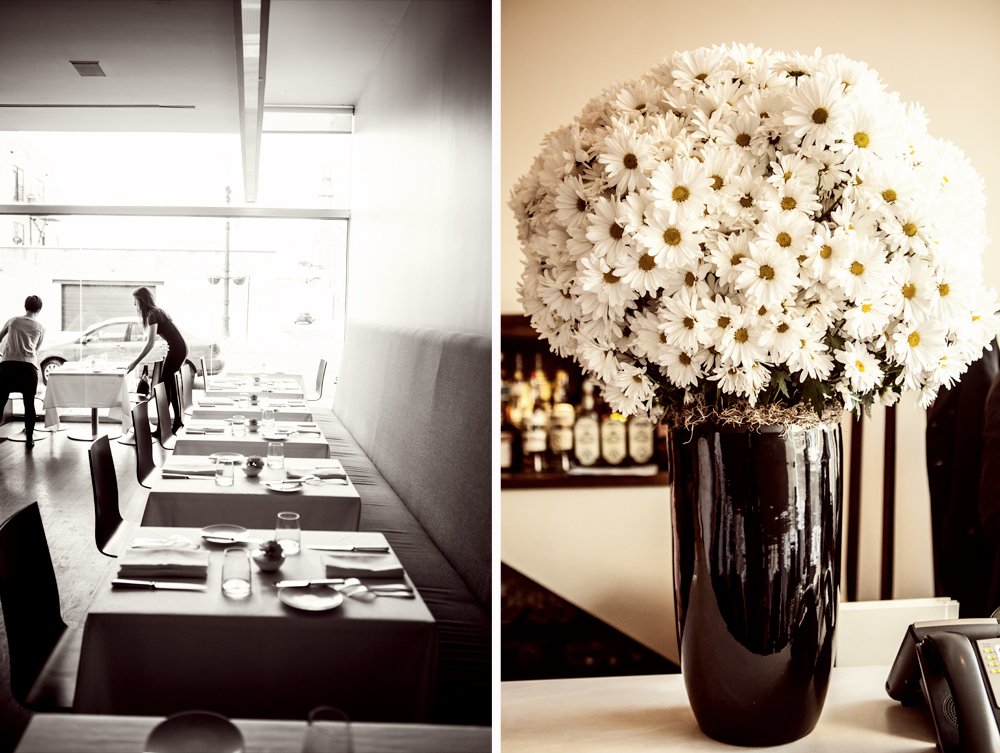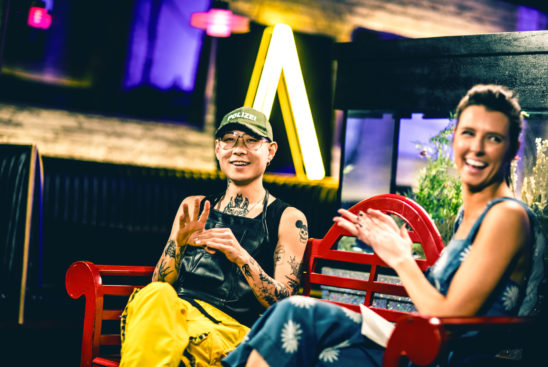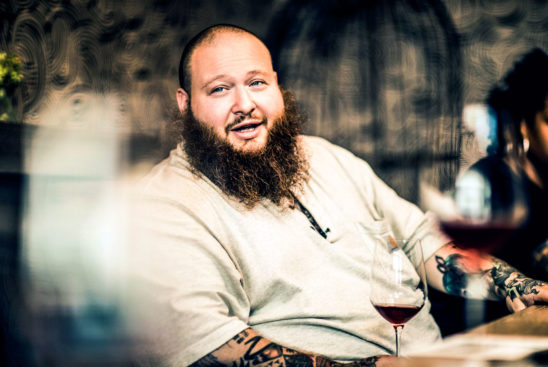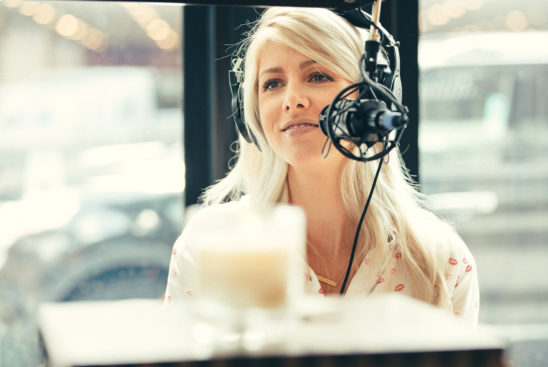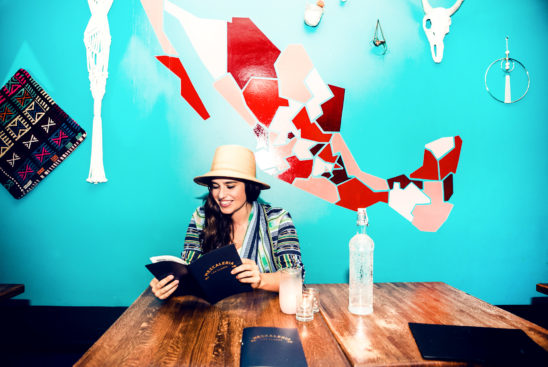What are you drinking?
Chef Paul Kahan: This is a Sazerac, a dry whiskey.
Managing Partner Donnie Madia: I’m drinking a Martinez, which is the precursor to a martini … The good news is [Paul and I] just made up on Monday, we just cleared some air. We’ve been together 17 years. 17 years!
When you met almost two decades ago, what led you to go into business with one another?
Paul: We had made a plan to meet at a coffee shop on Grace. It was me, Donnie and Rick Diarmit, who is not here. I rode my bike over there in the snow. I was sitting inside and Donnie pulled up in a 1983 [Pontiac] Sunbird. Not in mint condition either! He gets out and he’s wearing an amazing suit. It was a peculiar juxtaposition, this shitty car with this incredible suit. Donnie had already had this location [for Blackbird] secured so he showed me the plans and they were honestly like hieroglyphics to us at the time, I don’t think we understood them. They were a little above us. Then I said, “Do you guys have the money?” because my deal was I didn’t want to work for someone, I wanted to be a partner and I made that very clear. I wanted to do my own project.
Donnie: We knew that was the continuity for a great deal, not to hire someone but to make that person a part of the organization. At the time, there was more emphasis on the restaurateur versus emphasis on the chef and I believe the chef is who drives the food and for the most part the restaurant in many ways. I had heard so many stories about chefs leaving and wanting to do their own things so I thought it would be an interesting combination to have everyone as partners. This way we can grow a company and grow a business from a single restaurant in uniformity instead of the chef thinking, “Okay, I’ve worked for them and now I can do my own deal.”
Paul: There was no money in the beginning, we were way short so if I didn’t have a stake in the game I probably would have walked after our first giant blowout over any number of things. That’s part of the beauty of our relationship, we’ve grown up a bit and are much better, but we fought about every aspect of running the restaurant in the beginning. I think that sort of tension and both of us only having the upmost quality of hospitality in mind really helped us get to where we’re going.
Despite the arguments and tension in the early days, there were no hesitations?
Paul: To me it was like, if I’m ever going to get anywhere I’ve got to hang my ass out and take a chance so I said, “I’ll do it.” My line was, “I’ll go into business with you guys, but I’m not going to hang around you guys.” That was my line! I don’t know what you thought at the time like, “What is this guy, crazy?”
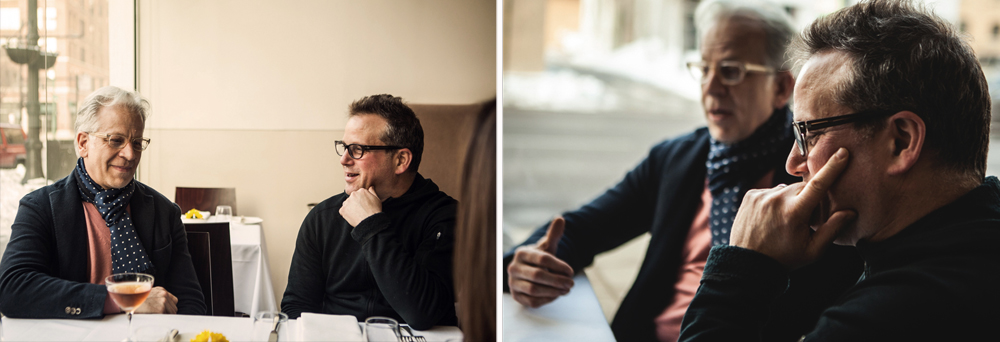
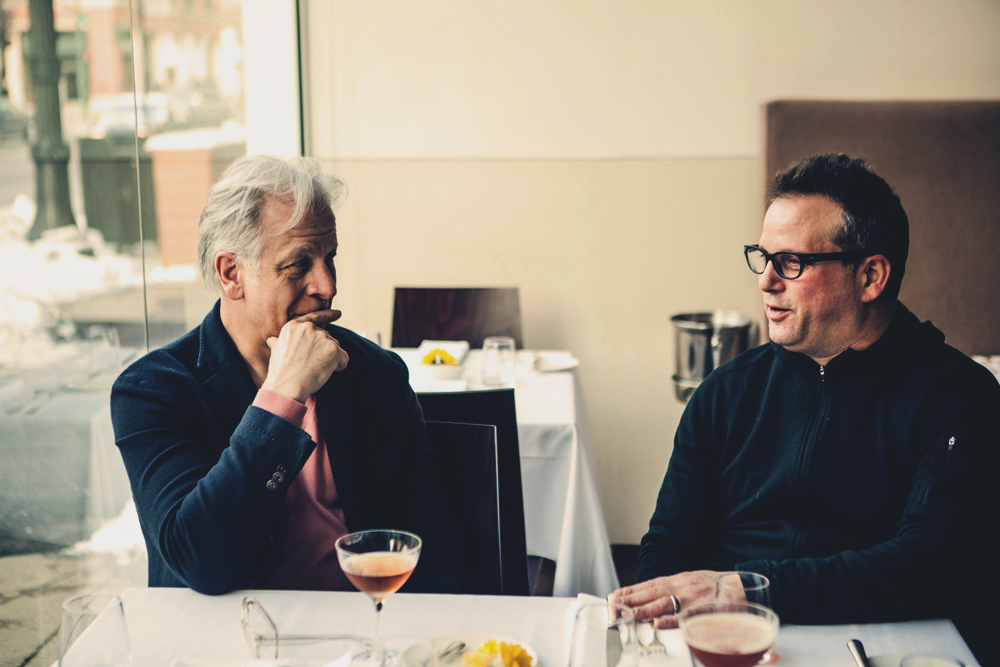

Why were you inspired to become entrepreneurs?
Donnie: We were all working for other people but had our own ideas and our own dreams that we were trying to bring to reality. I think we work first to revolt and do our own thing. We are one of a handful of restaurateurs and chefs that got together and became independents and I’m really proud of that. I think that we [at One Off Hospitality] are pioneers East of the expressway, we’re pioneers in this neighborhood and I think we’re pioneers in the business where chef equals restaurateur and restaurateur equals chef. It wasn’t like that in the beginning but we figured it out by the third or fourth blowout that it made sense that we were all equal partners.
Paul: And the truth be told, we didn’t know what the hell we were doing. We know a little bit more now but we kind of figure it out as we go. We figure if we’re nice to people and treat people well then we’ll be okay.
What is something you can tell us about Paul that you think makes him unique in this line of work?
Donnie: This is actually a compliment to his awareness of his surroundings in his business versus personal life. No matter where we are at, if we are in a meeting in New York or if we’re downstairs in our little 10×10 basement office with five or six of us crowded in there, an incredibly humbling part about Paul is if his wife calls he always picks up. Nothing else comes before that and I admire that.
Is it hard to juggle your business and personal lives?
Donnie: I think that you have to have an equilibrium in your personal life. For years and years you devote, you devote, you devote, you devote and after many relationships, what’s that devotion worth? So at the end of the day you can go home by yourself? No, you go home to your wife and your children. I have a one-year-old and he goes everywhere with us, he just came to dinner with us last night.
What is it that drives you today?
Paul: I call it our sustainable philosophy and I think it goes far beyond food. It’s really mostly about our staff, our partnerships and how we treat our farmers and all of our purveyors. We pay our bills, we’re honest with people and we don’t sh-t on people and I think that even in this day and age there are some slick operators out there where it’s all about the almighty dollar. I just listened to Erling Wu-Bower, the chef de cuisine at Nico [Osteria], addressing the catering staff from the hotel this morning and he said, “The reason why I work here is because it’s not all about the mighty dollar, it’s about doing something that you’re passionate about, doing it well and treating people right.” It was a great compliment to what we do and I think we always look at ways to do things more efficiently and ways to make our staff happier.

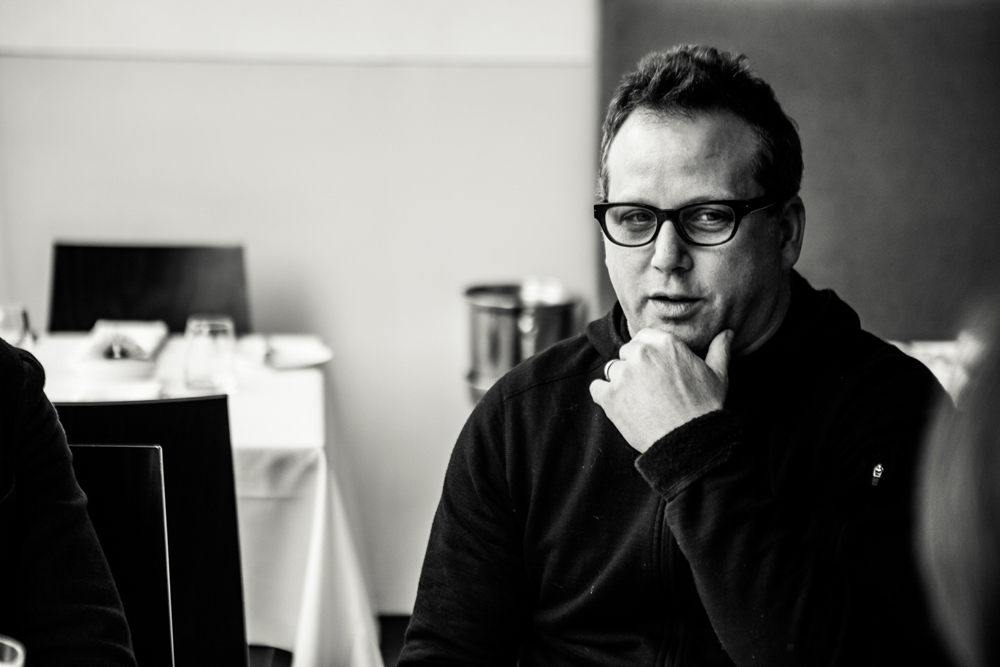


Out of all of your concepts, what is one that took off more than you expected?
Paul: Big Star. We thought it would be busy, it was a good location but from the first night on, wow! It’s really weird. I credit [our partner] Terry Alexander for coming up with the mexican food idea. He said it was my idea because I used to work at Frontera and Topolobampo but I swear I was pushing for hamburgers which would have been a massive failure. Terry was pushing for tacos. It’s divey, it’s comfortable, the music sounds a certain way. We just didn’t want to make it so slick that the neighborhood would revolt. We were really conscious that we wanted the hipsters to feel comfortable there.
Donnie: Bohemian.
Paul: Yeah, Bohemia. That was your word. I think we were really conscious of that. Terry and I pride ourselves on being serious dive bar guys. I’ve been going to the Rainbo Club for 25 years, it holds a really special place in my heart. It’s an iconic dive bar for a lot of reasons from the music to the layout. When Big Star opened I remember going in there that first night and sitting and thinking, “This feels really good. Something happened that worked out here.” Maybe it’s just luck. I’m sure it was a lot of planning and a lot of luck.
After studying under Rick Bayless, how did you manage to make a mexican restaurant your own and stand out?
Paul: I had just gone to southern California to do a dinner at a winemaker’s house and he took all of the chefs to this little taco place called La Super-Rica. I remember reading that it was Julia Child’s favorite mexican food. We went there and it’s really all about the tortilla, they make every tortilla by hand from fresh masa just like we do so that’s one thing. I think a big credo of ours there is that we’re not trying to make anything fancier than it should be. The tacos are really straightforward. We’re not putting things in a taco that aren’t supposed to be in a taco like foie gras. The queso fundido was the original queso fundido from when I started working at Frontera. I think I weighed 135 when I started working there. I knew I had to stop eating the queso fundido everyday when I had gotten up to 170. Because it’s so delicious! It’s like an umami bomb, it really is.
When you two do bump heads, how do you work through it?
Donnie: We’ve both been through a lot. We’re incredibly passionate about the business in itself. He’s very compassionate about the kitchen and I’m very compassionate about the front of the house so there is overlap there. [When we bump heads], I’m really not going to let him go home and be mad. I can’t because it’s too upsetting for me. I can’t sleep, he can’t sleep and we don’t want to have sleepless nights. We both have OCD tendencies, we want everything perfect. We know that it can’t be perfect on a day-to-day basis but we work hard at working on that and it’s difficult. The difficult part of being a perfectionist is that you gotta let go sometimes.
Paul: [Our most recent argument] wasn’t even a fight. It was just like, “Do I really want to bring this up?” and I just wasn’t in the right mindset. I didn’t want it to turn into something it wasn’t … I think after 17 years we are as close as brothers, really.
Donnie: We are going to protect each other, we are going to protect our staff and we are going to protect our business partners. We even protect our out-of-state brotherhood that we have in the restaurant business. We like to get the best deal, we want to win and we want to be the best. I think we both want each other to look at each other and go, “Nice job. Awesome.”
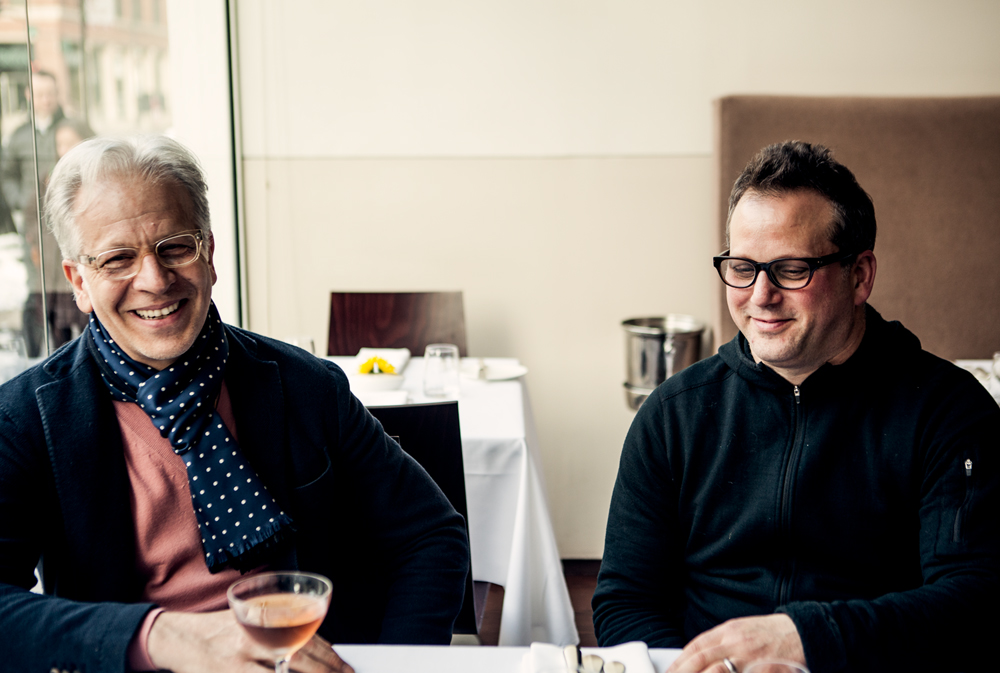

With such refined palates, do you have any guilty pleasure foods? Something you might be embarrassed to admit you enjoy?
Donnie: I’ll take runs to Jimmy’s on Grand and Pulaski for a polish dog. We took Anthony Bourdain there. So that’s my guilty pleasure, a polish dog with fries. I like that stuff, sandwiches and hot dogs.
Paul: Tons of stuff! I haven’t been there in awhile but for many years I’ve been going to the Diner Grill on Irving Park. It’s super greasy but I always get the same thing; a double cheeseburger with grilled onions and crispy hash browns. It’s a little greasy burger, the patties are really thin and they go on the griddle, the onions go on the griddle, the buns goes on the griddle and it’s like three bites but the crispy hash browns kind of bring it all together. So that combination together would be my guilty pleasure.
Now that chefs are becoming celebrities, what has it been like riding the wave of industry changes?
Paul: The first thing I thought was that it’s idiotic, it’s absurd to me. But it’s really not. It’s not for me, it’s not for our company. Our culinary director Justin [Large] did “Iron Chef” with Koren [Grieveson], who was our chef at Avec [at the time]. They’ve asked me to do it a million times but it’s just not my thing, I don’t want to compete even though I’m sure it would improve business across the board because it’s huge exposure. I was just in Miami at the South Beach Food and Wine Festival and all of those [celebrity chefs] were there and their draw is gigantic. I think ultimately it’s good for food. It exposes a lot of people to things that they otherwise wouldn’t be excited about but to me, I think there are a lot more important things in the world that we need to focus on beyond this crazy celebdom. It makes me really uncomfortable.
Who are you buddies with in the inner circle of notable chefs?
Paul: I’m great buddies with Michael Symon and have been for a long time before he was famous. I think “The Chew” is the number one show in the morning now, it’s huge. Michael is a really genuine, down-home kid from Cleveland. He’s got a great personality and he’s smart. Tom Coliccho [of “Top Chef”] is smart, political, tons of fun and loves music. He’s a great friend of both of ours. Mario [Batali] is a walking, talking celebrity, he’s always on and he’s incredibly intelligent. They are all really smart people and really great at what they do and most of them are really great chefs as well.
If you could have a drink with anyone, who would it be?
Donnie: My mom and my aunt. They were twins. My mom never got a chance to walk through that door, she passed away two and a half months before we opened. My aunt actually helped out for about six months here in the prep kitchen.
Paul: My dad was here a few times and helped us a lot with the opening of Blackbird and he never got to see Avec so I would most definitely love to have a drink with my dad. I never really knew my dad as well as I would have liked to because my parents got divorced when I was 13 and I was immersed in sports and just kind of tuned it all out. Still to this day my greatest tool is probably denial, I owe my personal sanity to the art of denial. But it would be nice for my dad to see everything that we’ve done. Beyond that, I was a math and science major in college so I think I would be fascinated to have a drink with Einstein. I don’t know if I would understand our conversation, but I’d like to try!
Did you enjoy this feature? Subscribe to our newsletter and never miss a drink, we promise we’ll never spam you!

